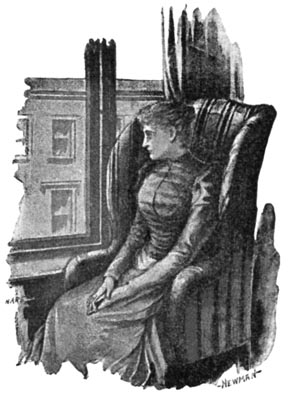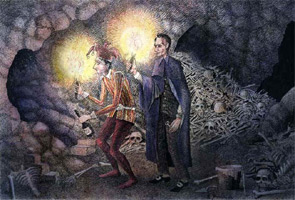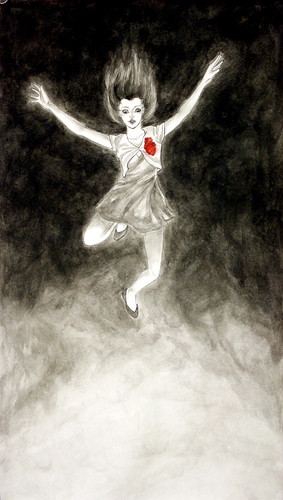Hidden Darkness:
(Mrs. Mallard Ungrateful Bitch or Free Woman./Montessor Crazy Killer with thirst of Power)
hello!! everyone the option I chose for third blog is the Number 3, as you may see my title may sound offensive or unprofessional, but as you read my blog you will understand why I'm calling Mrs Mallard a "free woman, or why i may call her with a derogatory word such as bitch". In the case of Montressor there is no other way for me to see him, I could only see a man that is capable to kill for power.
"The Story of an Hour" By Kate Chopin and the "Cask of Amontillado" by Edgar Allan Poe posses and shows many symbols and irony that a certain extent could could be consider dark.
On the one hand, in the "Cask of Amontillado" we can notice that irony is use mostly to gives touches of black/dark humor and suspense, it also gives the story that thrill and dark, hopeless and macabre images.
In Poe's story the first symbol of irony that can not go unnoticed is the word "cask" which is in the tittle. this word has for meaning barrel as well as casket or coffin (these last two are derived from the Latin root). in short, with this info we are able to understand that the "Cask" represents the Fortunato's Tomb, hopeless and claustrophobic death, and of course his casket. On the other hand, the character of Fortunato is full of this dark irony, first of all his name translated to English means Fortune, but as we all know he is not fortunate at all, his addiction for wine would take him to be trapped and finally to death. moreover, Poe tell us that Fortunato is a man of high class that is "respected...feared and millionaire" he appears dress "motley. He had on tight-fitting parti-striped dress, and his head was surmounted by the conical cap and bells."(525) his clothes contrast with his social and economical status, this part of Poe's dark humor. the fact that he is dress up as joker represents that he is a buffoon and fool that would be fooled by Montressor.
In the story there is many episodes where Poe shows irony through Montressor, they seem to be more noticeable in dialogues than symbols or images. A couple of examples are: when both characters see each other at the beginning of the story Montrressor says "My dear Fortunato, you are luckily met."(525) (lucky, i dont think so) this was not luck for Fortunato since this meeting would be the beginning of his death and beginning of Montressor evil plan. Furthermore, in numeros times Montressor seems to be worry about his fellow rival by telling him "we will go back your health is precious..{and when Montressor makes a toss for Fortunato by saying] I too fr your long life." (526) Here, he is a total hypocrite and this is also the biggest irony he was about trapped Fortunato in the cave and let him slowly die in darkness pretty much a total torture but there he was asking him about his health. Poe uses irony to give the story suspense and dark images to confuse and deviate the audience, so they would not know what the real intention of character are,(Montressor) so the reader would have a surprising climax and ending.

Story of an Hour, if this short story is read the first time the first that may come come to our minds would be"Oh!!! what kind of woman is this?? , getting happy due to the death of her husband, heartless, B$%^@, gold digger, selfish. but this story it is all the contrary, this is the story of a woman that for the first time she thought!!! she was going to be able to take her decision for herself that she will not be control by anyone....but to understand this we have to know that this short story took place in the 1800 where woman had no right for anything all they could do was to stay in the house. in the story she imagine " that there would be no powerful will bending hers."(338) meaning that she feels she is being control for many woman staying in the house was like being in jail being trapped and in the case of Mrs. Mallard was not different...this character is just the voice of women letting the world know the reality how they actually feel.
the irony in this story is somewhat dark due to the happiness experience by Mrs. Mallard in the event of the death of her husband. Chopin introduces her main character as woman that "was afflicted with a heart trouble" (337). Problems usually mean sentimental problems or sadness of some sort, applying this on the character her life was pretty much meaningless for her. As the story goes on Mrs. Mallard locks herself up in her room, there she has an epiphany where through window she sees a new beginning in her life. soon enough she worried her family her sister eagerly ask "Louise, Open the door I beg...you will make yourself ill."(338) as many submissive wife she was expected to be braking down and crying the death of her husband but ironically, she was" drinking in a very elixir of life"(338). this could interpret means her new life and the days that are to come for her and just for her and finally she could be that "goddess of victory" (338) ruling her own life and being free of the bending power of man. at the end of the story it results that her husband is alive, and when she sees him she dies and the doctors said "she had died of heart disease-joy that kills.(339). she had tastes freedom just for an hour, she felt what owning oneself feels like, and now without her liberty there is not life for her. also doctors say she died of joy that kill ironically they did not that she was feeling the "goddess of victory" they just assumed that she died that way because that was expected from women, also the doctors where men so they would just give the answer that was more convenient.
******A woman that does not fit in a man rule society had no other option that to died or sacrifice herself to obtain freedom!!!!
Chopin uses irony to transfer an specific message to her audience, which in this case is the suffering of women with out her her freedom. she uses symbolism to make this technique more effective. also she usues irony to give a surprising and in some way unexpected end that would make auidience realize and reflect on her message.
 I am going to start with D.H. Lawrence short story which is "The Horse dealer's Daughter," in this story the main characters Mabel Pervin and Dr. Jack Fergusson undergo dramatic experience in which both fall inevitable and in love. This story is also representing the power of love, how it could happen and how these love is able to transform the lives of these two characters. also there is many powerful symbols that actually show how these characters change. THE POND is the most important symbol of these story, this one represents many aspects of Mable life. "[As he walks in the pond]... he could smell the cold, rotten clay."(482). this might represent how isolated, lonely, sad and putrid her life is, This also could depict the feeling she has towards life she sees is senseless and unworthy she has no parents and lost all material possessions.For Mable and the Dr. the water in the pond symbolizes a new life a change, (this might resemble a religious baptism where the water is use to wash the sins of the life) similar to that Mabel is able to wash her old dark life and reborn."She looked up at him with flaring, humble eyes, of transfiguration, triumphant in first possession."( 484) this quote confirm her reborn and new life and how she is able to lose her dark shame. as a final thought in this story, Dr. as the story gets to the end make you believe that he is going to reject her with comment and feelings such as" He was afraid even a little horrified ...and he never intended to love her." (484-485). instead these comments and feeling s depict and express that love is something that no one is able to control and it is a feeling and experience that cannot be planned or foreseen this happen unexpectedly
I am going to start with D.H. Lawrence short story which is "The Horse dealer's Daughter," in this story the main characters Mabel Pervin and Dr. Jack Fergusson undergo dramatic experience in which both fall inevitable and in love. This story is also representing the power of love, how it could happen and how these love is able to transform the lives of these two characters. also there is many powerful symbols that actually show how these characters change. THE POND is the most important symbol of these story, this one represents many aspects of Mable life. "[As he walks in the pond]... he could smell the cold, rotten clay."(482). this might represent how isolated, lonely, sad and putrid her life is, This also could depict the feeling she has towards life she sees is senseless and unworthy she has no parents and lost all material possessions.For Mable and the Dr. the water in the pond symbolizes a new life a change, (this might resemble a religious baptism where the water is use to wash the sins of the life) similar to that Mabel is able to wash her old dark life and reborn."She looked up at him with flaring, humble eyes, of transfiguration, triumphant in first possession."( 484) this quote confirm her reborn and new life and how she is able to lose her dark shame. as a final thought in this story, Dr. as the story gets to the end make you believe that he is going to reject her with comment and feelings such as" He was afraid even a little horrified ...and he never intended to love her." (484-485). instead these comments and feeling s depict and express that love is something that no one is able to control and it is a feeling and experience that cannot be planned or foreseen this happen unexpectedly




